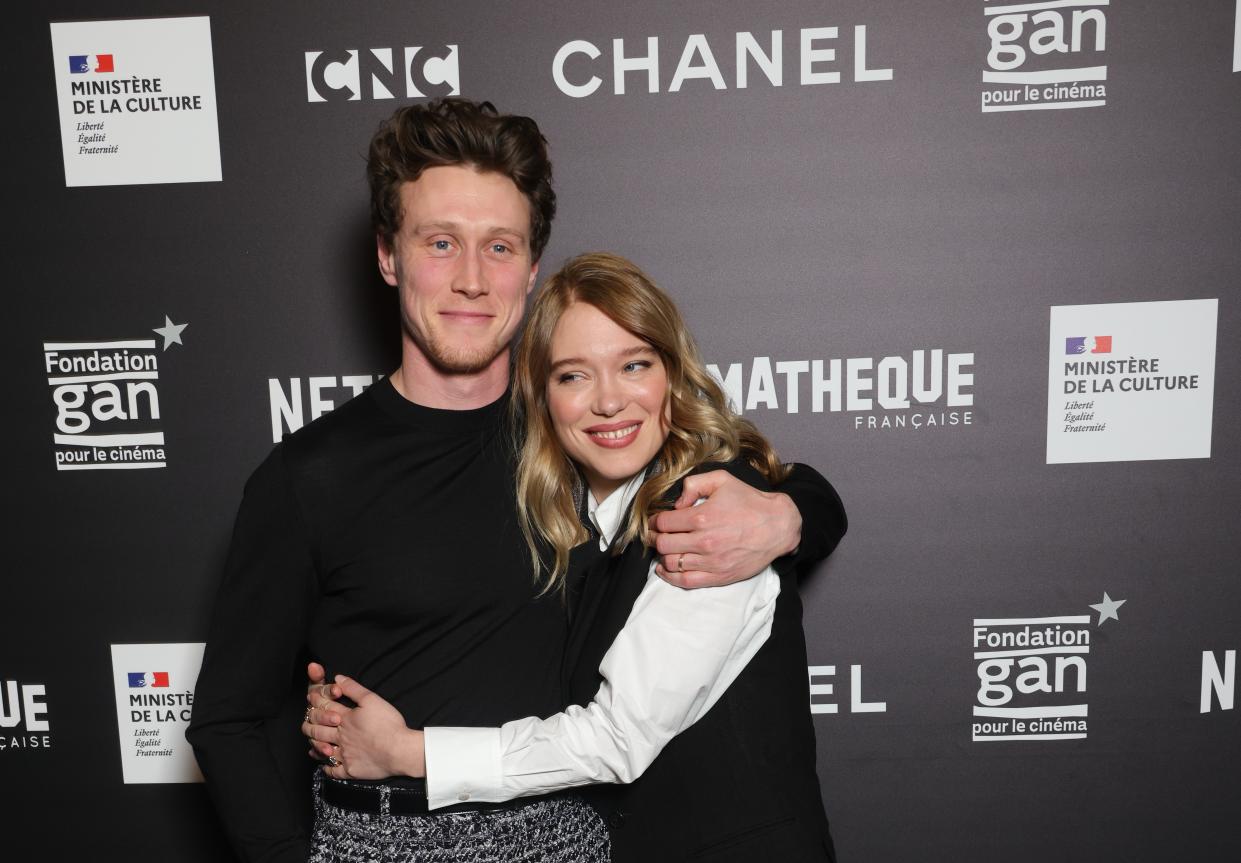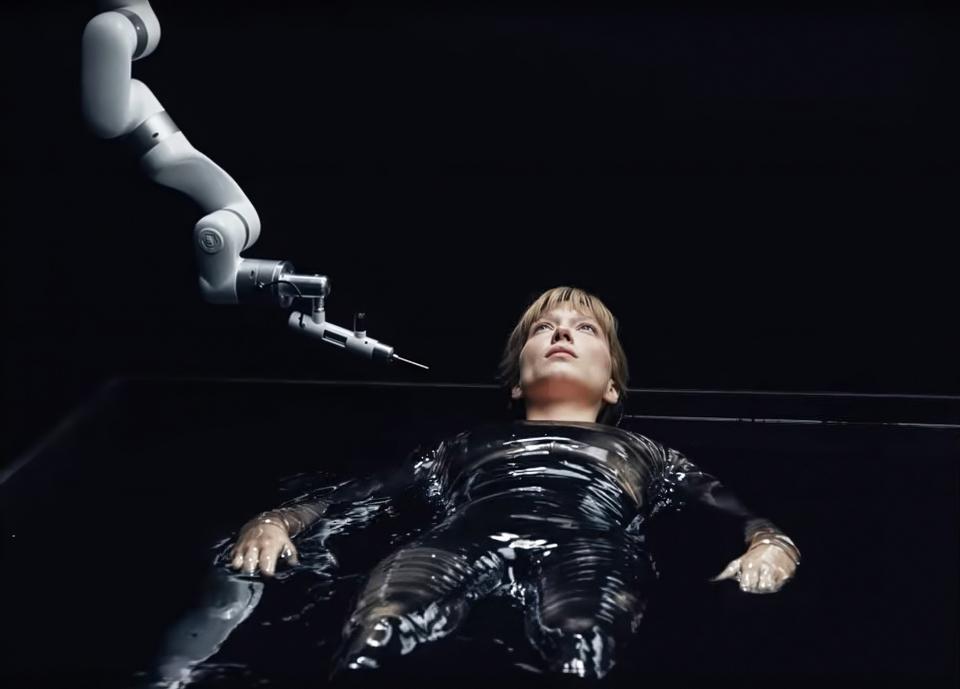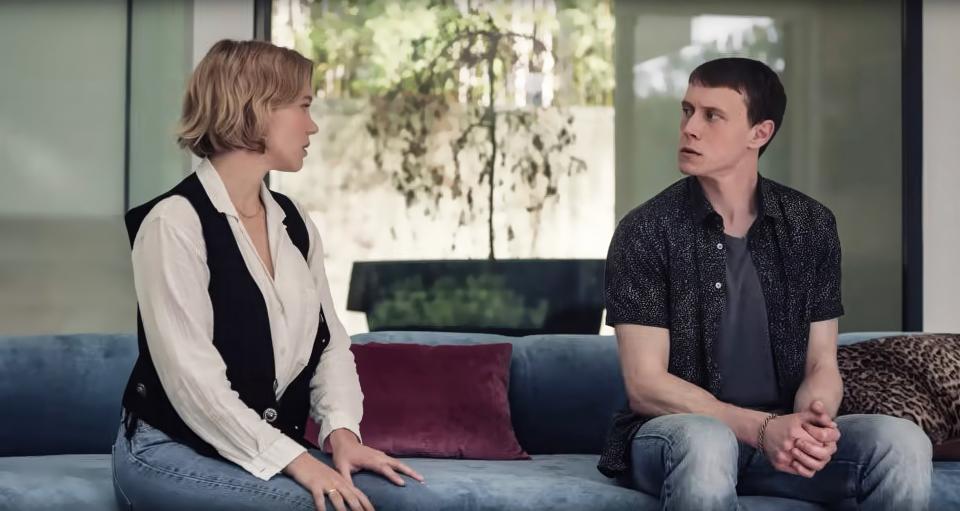Léa Seydoux and George MacKay on the Darkness of L.A.: If You’re Lonely and Depressed, It ‘Exacerbates All Your Feelings’

- Oops!Something went wrong.Please try again later.
- Oops!Something went wrong.Please try again later.
It’s too bright, the sunshine is monotonous, it’s very isolating. Those were the reasons why Chloë Sevigny, in a recent viral interview, said she will never live in Los Angeles. Anyone who’s lived there can relate to the loneliness that blankets the fragmented city, a collection of neighborhoods strung together by cars in traffic, where nobody walks or talks to each other. And why does everyone flake on plans? What are we afraid of?
That’s much like the central dilemma in Bertrand Bonello’s “The Beast,” a time-hopping sci-fi epic about the existential terrors of unrequited love, green-screen-acting, incel killers, artificial intelligence, and, oh, yes, Los Angeles. Léa Seydoux and George MacKay play reincarnated almost-lovers across time who can never make it work: first, in fin-de-siècle Paris (she’s married); then, in 2014 Los Angeles (he’s a sociopathic virgin inspired by 2014 Isla Vista shooter Elliot Rodger); and again in 2044 (when a procedure involving erasing your emotions to become a fitter, better, happier citizen is all the rage). The constant throughout is the beast of the title. The movie is based on a Henry James novella, “The Beast in the Jungle,” about a man too afraid of a terrible unknown event to act on or receive love. The awful event never comes, and nor does love.
More from IndieWire
Dev Patel Broke a Hand While Filming 'Monkey Man' - So He Fought with the Other One
'Legally Blonde' Spinoff Series in the Works from Reese Witherspoon at Amazon
The 2014 stretches of “The Beast,” which shuffles time like pieces in a shell game, find aspiring actress Gabrielle (Seydoux) almost exclusively alone in front of a screen. Phone screens, browser windows, calls with a Lynchian psychic, and green screens — Gabrielle is acting in a cell phone commercial entirely surrounded by one.

“I think it’s very very scary to be in front of a green screen. You have no contour. There’s no depth,” Seydoux told IndieWire. “You can’t see the angles. It’s like one mass. It’s very scary. Even when you walk, you don’t see the ground. It’s very oppressing in a way. I’ve done a film with a green screen, once. [2014’s French-language ‘Beauty and the Beast.’]”
Seydoux agreed that Gabrielle is “completely isolated in 2014. She doesn’t have real interactions with people, and when she has one, it’s with a guy who’s completely fucked-up.”
That guy is a desperately virginal millennial named Louis Lewanski (George MacKay, who replaced Gaspard Ulliel after his death) who in Armani sunglasses and a Range Rover self-tapes monologues about why women are the root of all evil in the world for rejecting him. The character is directly lifted from Rodger, who killed seven people in 2014 and made national news for his anti-women manifestos.
“I didn’t know much about Elliot Rodger. He wasn’t touched upon in the media as much in the UK,” said British actor MacKay, who makes his version of Rodger instantly recognizable to those familiar with his heavily publicized murder spree that year. MacKay said he found Rodger’s YouTube monologues “difficult to say because there’s no subtext. Usually, you say something other than what you mean with acting, and therefore the writing serves you, but there’s such a blocky unequivocal nature to his dialogue that it was quite difficult.” (Bonello told IndieWire in Venice that he was “impressed” by Rodger’s monologues. “I couldn’t write that,” the director said.)

MacKay said, “This is in no way celebrating Elliot Rodger, [but] one thing that we looked at in terms of some of the extra bits that we shot about the sort of B roll, so to speak, that you see cut into the film of things Elliot was filming, is again this question: What the film is about, on the one hand, one person pointed in one direction could be a genius, and one person with an obsessive mind faced at a notebook and typewriter and championed by a publisher becomes our greatest novelist. Then that same person, without pen and paper, becomes a complete madman.”
The mass shooting executed by Rodger took place two hours north of Los Angeles, but his spectre (he fatally shot himself), wrought from a maddened swirl of toxic masculinity and sexism, certainly haunted L.A. that summer. It’s a city whose already sinister veneer Bonello was keen to explore; there are shots here of Hollywood Blvd. as menacing as Lynch’s “Inland Empire” as Louis stalks women, and eventually targets Gabrielle.
“I’m wary of speaking out of turn [about Los Angeles],” said MacKay, Zooming in fact from L.A. “There are many beautiful things and many beautiful happenings, like all places, but there is a darkness and maybe a madness here. There’s a level of isolation. It’s a town built in the desert and built upon dreams and built upon a hypothetical reality, and then you couple that with the layout. No one sits on a tube together, no one sits on a subway together. You’re always isolated in your travel. Communal spaces are rare. Part of its beauty but also its darkness, is that it’s founded upon imagination and dreams. I’m enjoying it more and more when I come here, but there’s definitely a darkness.”
“It’s funny how [with] L.A., if you feel lonely and are a bit depressed, it exacerbates all your feelings,” Seydoux said. “If you are depressed in L.A., it’s just awful. But if you have […] a positive feeling about something, it’s the opposite.”
“It’s almost like that glass half full, half empty thing. [L.A.] suits where you’re at,” MacKay said. “You project upon it, and it projects upon you a little bit, moreso than you just feel how you feel when you’re in London, or in Paris. L.A., there’s a dreamy murkiness to it.”
In the future-set, 2044 days of “The Beast,” a dystopian Paris is emptied of most people, people walk among wild animals without concern, and human interaction unfolds with creepy, stilted ceremony. That’s because the days for human affect are numbered, as emotions are being wiped from brains to make people more efficient workers. That parallels eerily the erasure of human affect that’s central to artificial intelligence and has been a concern for actors, including Seydoux, demanding safeguards against their images being exploited by studios for future use.
“I made a joke, I was like, ‘Why don’t you use my voice?’ I shouldn’t be working. I shouldn’t be losing time on ADR. I can just give you the agreement,” Seydoux. “It’s kind of scary, but I believe in humanity. Even though I can see that … incarnation is fading away. Things are less incarnated, but maybe I’m wrong. But I believe that you own your own image. We have to create laws for that. But I don’t think we can be robotized. I don’t believe in robotization. Humanity, the evolution of humanity, will [prevail]. I don’t believe in replacing humanity.”
“The Beast” opens in select theaters from Sideshow and Janus Films on Friday, April 5.
Best of IndieWire
The 12 Best Thrillers Streaming on Netflix in April, from 'Fair Play' to 'Emily the Criminal'
Quentin Tarantino's Favorite Movies: 61 Films the Director Wants You to See
Sign up for Indiewire's Newsletter. For the latest news, follow us on Facebook, Twitter, and Instagram.

